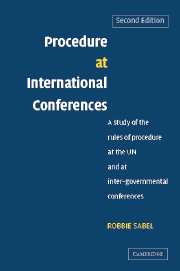 Procedure at International Conferences
Procedure at International Conferences Book contents
- Frontmatter
- Contents
- Preface to the second edition
- List of abbreviations and conference references
- Introduction
- 1 Historical development of rules of procedure of conferences and attempts to establish model rules
- 2 Adoption of rules of procedure
- 3 Rules of procedure and international law
- 4 Invitations, participation and credentials
- 5 Presiding officer and other officers of the conference
- 6 Meetings
- 7 Statements by delegations
- 8 Submission of proposals
- 9 Adjournment and closure of debate
- 10 Amendments
- 11 Withdrawal and reconsideration of motions
- 12 Procedural motions and points of order
- 13 Priorities between different proposals
- 14 Decision taking and method of voting
- 15 Majority required
- 16 Consensus
- 17 Separate votes
- 18 Conduct of voting – interruption of voting and correction of vote
- 19 Languages, records and documents
- 20 Committees
- 21 Suspension and amendment of rules of procedure
- Bibliography
- Index
7 - Statements by delegations
Published online by Cambridge University Press: 22 July 2009
- Frontmatter
- Contents
- Preface to the second edition
- List of abbreviations and conference references
- Introduction
- 1 Historical development of rules of procedure of conferences and attempts to establish model rules
- 2 Adoption of rules of procedure
- 3 Rules of procedure and international law
- 4 Invitations, participation and credentials
- 5 Presiding officer and other officers of the conference
- 6 Meetings
- 7 Statements by delegations
- 8 Submission of proposals
- 9 Adjournment and closure of debate
- 10 Amendments
- 11 Withdrawal and reconsideration of motions
- 12 Procedural motions and points of order
- 13 Priorities between different proposals
- 14 Decision taking and method of voting
- 15 Majority required
- 16 Consensus
- 17 Separate votes
- 18 Conduct of voting – interruption of voting and correction of vote
- 19 Languages, records and documents
- 20 Committees
- 21 Suspension and amendment of rules of procedure
- Bibliography
- Index
Summary
The right of representatives to speak
The right of representatives to explain their position and attempt to convince other delegations is a fundamental right of all delegations participating in a conference. Together with the right to submit proposals and the right to participate in decision taking, it is one of the three basic rights that must appear in every set of rules of procedure.
Representatives are not however obliged to speak and there does not appear to be any authority where a representative has been ordered to speak. At a 1973 meeting of the UNGA, the Libyan representative requested that the UK delegation immediately report to the Committee on the situation in Southern Rhodesia. The UK representative demurred, whereupon the Libyan representative proposed that the Committee call upon the UK representative to speak and the Committee approved the Libyan proposal. The UK representative said that it was not within the power of the Committee to insist on a particular delegation speaking at a particular time. The meeting was then adjourned without any further action being taken.
The WHO has formalised the procedure whereby ‘In order to save time, whenever one delegate is invited to come to the rostrum to make a statement, the next delegate on the list of speakers will also be called to the rostrum, where he or she will sit until the time to speak has come.’
- Type
- Chapter
- Information
- Procedure at International ConferencesA Study of the Rules of Procedure at the UN and at Inter-governmental Conferences, pp. 110 - 144Publisher: Cambridge University PressPrint publication year: 2006


